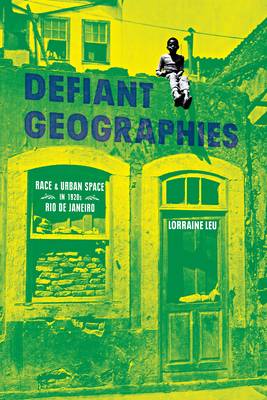
- Afhalen na 1 uur in een winkel met voorraad
- Gratis thuislevering in België vanaf € 30
- Ruim aanbod met 7 miljoen producten
- Afhalen na 1 uur in een winkel met voorraad
- Gratis thuislevering in België vanaf € 30
- Ruim aanbod met 7 miljoen producten
Zoeken
Omschrijving
Defiant Geographies examines the destruction of a poor community in the center of Rio de Janeiro to make way for Brazil's first international mega-event. As the country celebrated the centenary of its independence, its postabolition whitening ideology took on material form in the urban development project that staged Latin America's first World's Fair. The book explores official efforts to reorganize space that equated modernization with racial progress. It also considers the ways in which black and blackened subjects mobilized their own spatial logics to introduce alternative ways of occupying the city. Leu unpacks how the spaces of the urban poor are racialized, and the impact of this process for those who do not fit the ideal models of urbanity that come to define the national project. Defiant Geographies puts the mutual production of race and space at the heart of scholarship on Brazil's urban development and understands urban reform as a monumental act of forgetting the country's racial past.
Specificaties
Betrokkenen
- Auteur(s):
- Uitgeverij:
Inhoud
- Aantal bladzijden:
- 238
- Taal:
- Engels
- Reeks:
Eigenschappen
- Productcode (EAN):
- 9780822946007
- Verschijningsdatum:
- 31/03/2020
- Uitvoering:
- Hardcover
- Formaat:
- Genaaid
- Afmetingen:
- 150 mm x 231 mm
- Gewicht:
- 498 g

Alleen bij Standaard Boekhandel
+ 152 punten op je klantenkaart van Standaard Boekhandel
Beoordelingen
We publiceren alleen reviews die voldoen aan de voorwaarden voor reviews. Bekijk onze voorwaarden voor reviews.








